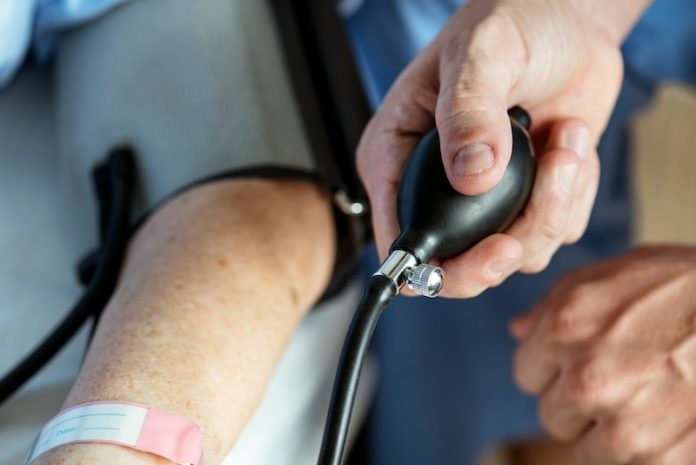
High blood pressure, or hypertension, occurs when the force of blood pushing against the walls of your arteries is consistently too high. It’s measured in millimeters of mercury (mmHg) and recorded as two numbers: systolic pressure (the higher number) and diastolic pressure (the lower number).
A normal blood pressure reading is below 120/80 mmHg, but if it regularly exceeds 130/80 mmHg, it’s considered high. This threshold can vary slightly depending on age, overall health, and other medical conditions.
Several factors contribute to high blood pressure, including genetics, high salt intake, lack of potassium, a sedentary lifestyle, stress, and certain medical conditions.
Often called the “silent killer,” hypertension usually shows no symptoms, but if left untreated, it can lead to serious health problems like heart disease, stroke, and kidney disease.
Because of this, regular blood pressure checks are crucial, and managing hypertension through lifestyle changes or medication is important.
A new study published in Cardiovascular Innovations and Applications brings hope for people over 60 struggling with high blood pressure.
The researchers aimed to identify the ideal systolic blood pressure (SBP) target for older patients, using a sophisticated method called Bayesian network meta-analysis, which combines data from multiple studies for more reliable results.
The study analyzed health outcomes, including major cardiovascular events (MACE), heart disease deaths, all-cause deaths, heart attacks, heart failure, and strokes.
Data from six different clinical trials were included, and the participants’ treatments were grouped based on their final SBP: less than 130 mmHg, between 130-139 mmHg, and 140 mmHg or higher.
The findings were notable. Participants whose SBP was kept below 130 mmHg experienced a significant reduction in major cardiovascular events compared to those with SBP levels of 140 mmHg or more.
Although the data suggested that more intensive blood pressure control might reduce deaths from heart disease, heart attacks, heart failure, and strokes, these differences weren’t statistically significant.
This suggests that for older adults, keeping systolic blood pressure below 130 mmHg may be the most effective approach for preventing heart-related problems. However, the researchers stressed that more studies are needed to confirm these findings.
Tips for Managing Your Blood Pressure
Maintaining healthy blood pressure is vital for reducing the risk of heart disease, stroke, and kidney disease. Here are some practical tips:
- Monitor Regularly: If you have high blood pressure, check it regularly at home or in a healthcare setting. This can help track how well your management plan is working.
- Maintain a Healthy Weight: Being overweight puts extra strain on your heart and increases your risk of high blood pressure. Losing weight through a balanced diet and regular physical activity can help lower your pressure.
- Eat a Balanced Diet: Incorporate plenty of fruits, vegetables, whole grains, lean proteins, and low-fat dairy into your meals. Reducing intake of saturated fats, trans fats, added sugars, and salt is key for heart health.
- Exercise Regularly: Aim for at least 150 minutes of moderate-intensity exercise, like walking or swimming, each week, or 75 minutes of vigorous activity, such as jogging or cycling.
- Quit Smoking: Smoking damages blood vessels and raises blood pressure. Quitting can improve both blood pressure and overall health.
- Limit Alcohol: Too much alcohol can raise blood pressure. Stick to one drink per day for women and two drinks for men to reduce your risk.
- Manage Stress: Stress can cause temporary spikes in blood pressure. Activities like yoga, deep breathing exercises, and meditation can help manage stress.
- Follow Medication Guidelines: If your doctor prescribes medications for hypertension, take them as directed. Regularly monitor your blood pressure to ensure your treatment is working effectively.
Heart Health Insights
Ongoing research is also revealing additional ways to support heart health. Studies suggest that apple juice may benefit heart function, and yogurt has been linked to reduced death risks in people with heart disease.
On the other hand, foods like black licorice can dangerously raise blood pressure, and certain plant nutrients might help lower it.
The study, conducted by Yuling Yan and colleagues, provides valuable insight into blood pressure management for older adults. By keeping systolic blood pressure under 130 mmHg, it may be possible to significantly reduce the risk of major cardiovascular events and improve overall heart health.
Regular monitoring and healthy lifestyle changes remain essential for maintaining good blood pressure and preventing related health problems.
If you care about blood pressure, please read studies about unhealthy habits that could increase high blood pressure risk, and eating eggs in a healthy diet may reduce risks of diabetes, high blood pressure.
For more information about blood pressure, please see recent studies that early time-restricted eating could help improve blood pressure, and results showing 12 foods that lower blood pressure.
Copyright © 2024 Knowridge Science Report. All rights reserved.



